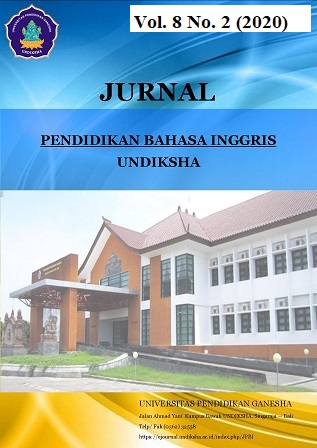TEACHER'S QUESTIONING STRATEGIES IN JUNIOR HIGH SCHOOL: A CASE STUDY
DOI:
https://doi.org/10.23887/jpbi.v8i2.31063Abstract
Since questioning plays an important role in the teaching-learning process, the teachers' questions affect the students' learning motivation, particularly in asking or answering a question. This study was a case study which aimed to find out the types of questioning strategies and types of question used by the English teachers. This study's subject was two English teachers who taught seventh-grade students. The data were collected through a questionnaire (Google Form), and it was verified using the interview guide with teachers. This study showed that teachers used five strategies in applying the question: prompting, probing, redirecting, cold call, and wait. Then, the teachers asked three types of questions: procedural, convergent, and divergent questions. Meanwhile, the teachers mostly asked a procedural question and convergent rather than a divergent question. Furthermore, the teacher was expected to promote divergent questions to involve the students' critical thinking.
Keywords : Questioning Strategies, Types of Questions
References
Astrid, A., Amrina, R. D., Desvitasari, D., Fitriani, U., & Shahab, A. (2019). The Power of Questioning: Teacher’s Questioning Strategies in the EFL Classrooms. Indonesian Research Journal in Education (IRJE), 91-104.
Cotton, K. (1988). Classroom Questioning. School Improvement Research Series.
Creswell, J. (2012). Educational Research: Planning, Conducting and Evaluating Qualitative and Quantitative Research. United States: Pearson Edition.
Dos, B., Bay, E., Aslansoy, C., Tiryaki, B., Cetin, N., & Duman, C. (2016). An Analysis of teachers’ questioning strategies. African Journal of Agricultural Research, 2065-2078
Erianti, A., Akib, E., & Baso, F. A. (2018). An Analysis Of Teachers’ Questioning Strategies In Elt (English Language Teaching) The Classroom Interaction At Eleventh Grade Sma Muhammadiyah 1 Unismuh Makassar. Exposure Journal, 58-70.
Erlinda , R., & Dewi, R. (2014). Teacher’s Questions In EFL Classroom. Ta'dib, 177-178.
Hamiloğlu, K., & Temiz, G. (2012). The Impact Of Teacher Questions On Student Learning In Efl. Journal Of Educational And Instructional Studies In The World, 1-18.
Inan, B., & Fidan, D. (2012). Inan, B., and Fidan, D. (2013). Teacher question and their function in Turkish as a foreign language (TEFL) classes. Social and Behavioral Sciences, 1070-1077.
Lai, E. (2011). Critical Thinking: A Literature Review. Pearson.
Lynch, T. (1991). Questioning Roles in the Classroom. ELT Journal, 201-210.
Ma, X. (2008). The Skills of Teacher’s Questioning in English Classe. International Education Studies, 92-100.
Matra, S. D. (2014). Teacher Questioning In Classroom Interaction. Journal of Culture, English Language Teaching & Literature, 82-111
Moss, P. (2016, February 3). 4 Questioning Strategies For Effective & Thoughtful Teaching. TeachThought.
Öztürk, E. O. (2016). Types Of Questions Used In Efl Classrooms: A Reflective Study on A Turkish Efl Teacher’s Practices. International Journal of Language Academy, 164-173
Padmadewi, N. N., Artini, L. P., & Agustini, D. A. (2017). Pengantar Micro Teaching. Yogyakarta: Raja Gavindo.
Pratama, W. (2019). An Analysis Of Teacher’s Questioning Strategies In Teaching English At The Tenth Grade Of Sman 1 Sambit. Ponorogo: English Education Department Tarbiyah And Teacher Training Faculty State Institute Of Islamic Studies.
Richards, J. C., & Lockhart, C. (1996). Reflective Teaching in Second Language Classrooms. Cambridge, New York: Cambridge University Press.
Rido, A. (2017). Questioning Strategies Of Master Teachers In Indonesian Vocational English Classrooms. TEFLIN Journal, 194-208.
Rismayanti. (2018). An Analysis Of Teacher’s Questioning Strategies During The Classroom Interaction At Piba Of Uin Alauddin Makassar. Makasar: English Education Department Tarbiyah And Teaching Science Faculty State Islamic University Of Alauddin Makassar.
Shen, P. (2012). A Case Study of Teacher’s Questioning and Students’ Critical Thinking in College EFL Reading Classroom. International Journal of English Linguistics, 199-206.
Shomoossi, N. (2004, September 2). The Effect Of Teachers’ Questioning Behavior On Efl Classroom Interaction: A Classroom Research Study. The Reading Matrix, pp. 96-104.
Sujariati, Rahman, Q., & Mahmud, M. (2016). English Teacher’s Questioning Strategies in EFL Classroom at SMAN 1 Bontomarannu. ELT Worldwide, 108-120.
Wangru, C. (2016). The Research on Strategies of College English Teachers Classroom Questioning. International Education Studies, 144-158.
Wood, A. T., & Anserson, C. H. (2001). The Case Study Method: Critical Thinking Enhanced By Effective Teacher Questioning Skills. ERIC, 1-12.
Downloads
Published
Issue
Section
License
Authors who publish with the Jurnal Pendidikan Bahasa Inggris Undiksha agree to the following terms:- Authors retain copyright and grant the journal the right of first publication with the work simultaneously licensed under a Creative Commons Attribution License (CC BY-SA 4.0) that allows others to share the work with an acknowledgment of the work's authorship and initial publication in this journal
- Authors are able to enter into separate, additional contractual arrangements for the non-exclusive distribution of the journal's published version of the work (e.g., post it to an institutional repository or publish it in a book), with an acknowledgment of its initial publication in this journal.
- Authors are permitted and encouraged to post their work online (e.g., in institutional repositories or on their website) prior to and during the submission process, as it can lead to productive exchanges, as well as earlier and greater citation of published work. (See The Effect of Open Access)













